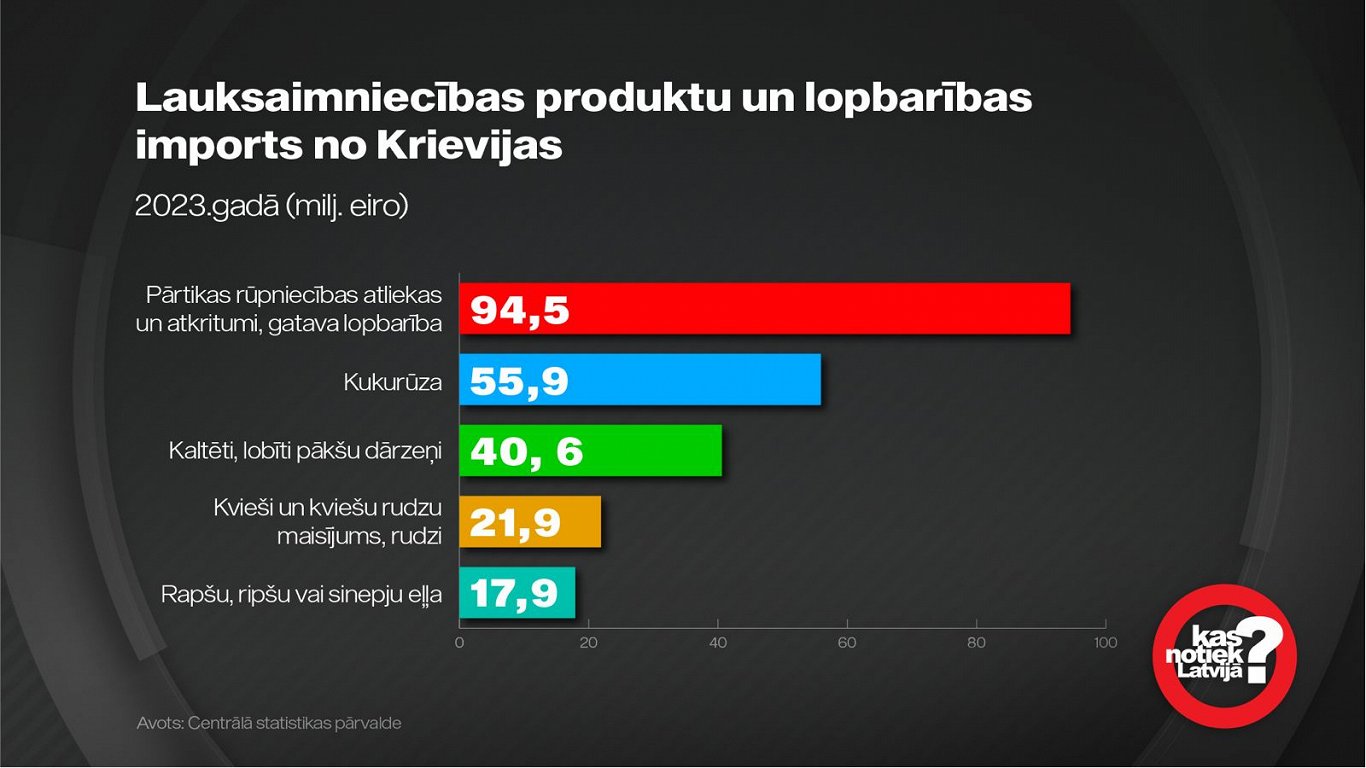"In 2023, we purchased 6.5 thousand tonnes of sunflower pellets from an EU-registered fodder wholesaler in Estonia. The pellets originated in Russia. We have already terminated this agreement. Unfortunately, due to the activities of Polish farmers, blocking the flow of cargo from Ukraine, there was no alternative for the company to provide food for the large chicken family,” said Balticovo's Director of Communication and Development, Toms Auškāps, in a written reply to KNL's questions about the reasons why the company used fodder imported from Russia last year.
Balticovo refused to disclose the amount paid for that purchase and which Estonian wholesaler participated in such a transaction. Auškāps said that 6.5 thousand tonnes were purchased between May and November 2023. Balticovo has 3.5 million hens, while the annual consumption of poultry feed reaches around 120 thousand tonnes produced by the company itself. Grains for poultry feed production are bought from local farmers and wholesalers, while sunflower pellets, which Auškāps says are an essential source of protein, fiber and minerals for chickens, are imported.
"There are no alternatives to this product and it is only produced in Russia, Ukraine, and Argentina in significant quantities. This product is not available from Argentina," said Balticovo's representative, noting that the company is currently entering into cooperation agreements with wholesalers to purchase poultry feed materials only from Ukraine in the future.
The website “Farmit.lv” currently offers sunflower sprouts or cake with delivery to Latvia for EUR 365 per tonne. Thus, even assuming that the product of Russian origin was cheaper last year than the currently offered product of Ukrainian origin in Latvia, it can be concluded that Balticovo chickens ate sunflower sprouts from Russia last year for at least two million euros.
In total, twelve companies listed as destinations of fodder from Russia in Latvia in 2023 can be found on the list drawn up by the Food and Veterinary Service (PVD). Four of them – BALTIC TRANSSHIPMENT CENTER, TRANSIT SERVICE AGENCY, Ekers Stividors LP and Grostatrans – are based in Liepāja, two – ALPHA PORT and COMPASS TRANSIT – in Riga, and another – Ventspils Grain Terminal – in Ventspils. Accordingly, it is reasonable to believe that fodder cargoes, the destination of which is companies operating in the transit and logistics sector, have crossed Latvia in transit.
Precise data on how much of the fodder imported by Russia has been cleared for release for free circulation in Latvia, how much has entered the European Union market and how much is for third-country markets the PVD does not have at its disposal.
It should be noted that the volume of imports in this section has increased dramatically, more than ten times. Before the war the average annual volume was lower than last year's monthly average.
Turning to the State Revenue Service, KNL found out that according to customs data, last year a total of nineteen merchants had imported from Russia for release for free circulation under Combined Nomenclature code 23, which designates products in the group “residues and waste of the food industry, ready fodder”.
“Goods released for free circulation shall acquire the status of Union goods and shall circulate freely throughout the territory of the European Union. They may be consumed in Latvia or transported to another Member State of the European Union without the application of a customs procedure. Consequently, the Customs Administration does not have information on how much goods are consumed in Latvia after release for free circulation,” said the State Revenue Service in its reply to the question about how much of the total import value of oil cake, for example, which exceeded EUR 67 million last year, may have entered the Latvian market.
The Central Statistical Bureau does not compile detailed data on the consumption of fodder in Latvia, however, the balance sheet of production and consumption of cereals and products thereof shows that 579 thousand tons were consumed in Latvia in 2022. Meanwhile, the total amount of animal feed imported from Russia last year in tonnes is nearly double that and exceeds a million tonnes.
On the agenda of the Saeima, the issue of the ban on imports of agricultural products and feed came only this week, two years after Russia's full-scale invasion of Ukraine. According to the estimates of the Ministry of Agriculture, Latvia ranks second among the EU Member States in the import of agricultural products and fodder, while the lumens from these imports consist of fodder, cereals, pulses and rapeseed oil.
The version of the ban, which will be decided by the Saeima this week, provides that by July 1, 2025 imports of agricultural products and fodder from Russia and Belarus will be prohibited in Latvia, including imports of products and fodder of the relevant origin from other third countries.




























